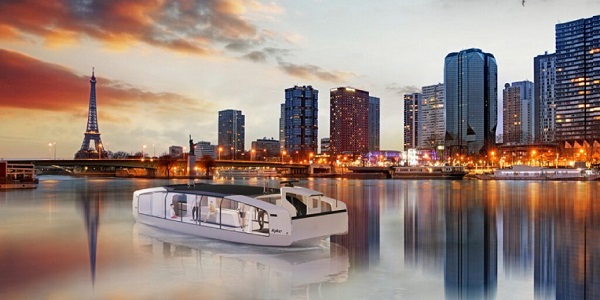Norweigian firm to introduce autonomous electric commuter ferries
Norwegian engineering company the Eker Group has begun work on a project that seeks to introduce a fleet of autonomous electric ferries for providing commuter services in some of the world’s largest cities.
The Hyke project came about in response to what the Eker Group realised was a need for an effective inner city mobility system that also guaranteed efficient land use and reduced road traffic and pollution. The initial examples are slated to enter service in the southern Norwegian city of Fredrikstad before the end of the year, though the project partners hope to also make the mobility solutions suitable for operators in other regions such as the Orient and the Middle East.
Besides promising an alternative mode of mass transit, Hyke is also making the concept available to smaller scale operators such as property developers in exclusive waterfront residential communities. The Eker Group believes having these autonomous vessels available will help free up existing land for more profitable uses.
An all-electric solution with supporting infrastructure
The ferries to be developed under Hyke will feature an all-electric drivetrain and a highly-efficient hull and thermal system. Sustainable means of supplying power include rooftop solar panels and wireless charging capability. There is also an option to integrate a backup battery into the jetties to reduce reliance on grid connection upgrades. Besides the smart functions, the ferry and docking systems follow a standardised design so that it is compatible with existing infrastructure in addition to being ready for mass production.
The exterior of each ferry will be streamlined while the interior will be spacious and air-conditioned. Access is possible for passengers with bicycles and even for wheelchair users and other people with limited mobility. The design of the vessels themselves is modular to enable operators to deploy ferries with lower passenger capacities should the need arise.
| Read More: Smart Saver: Kongsberg Maritime waterjets for a SAR vessel |
Autonomous technology is meanwhile being promoted to operators who wish to employ fewer staff, which then translates into lower costs. The technology means that not only will the ferries be capable of safely navigating on their own even without human crews, operators can use management software to be constantly updated on the status of their respective fleets.
Gradual implementation for operators
The autonomous systems are designed to be gradually integrated into the vessels to enable operators to familiarise themselves with the technology before implementing it on a broader scale. Three stages of incorporation are being proposed:
- Augmented – The vessel will be operated by an embarked crewmember but will have an autopilot as well as sensors for improving situational awareness.
- Semi-autonomous – The vessel is configured for autonomous operation. The crewmember will be replaced with a safety officer who will oversee critical functions.
- Fully autonomous – The vessel is configured for autonomous operation and the only people on board are passengers. Human operator intervention is in the form of remote monitoring from a shore-based control centre.
Hyke also promises to be flexible enough that an operator can easily adjust the frequency of vessel trips depending on current needs. Sailings can either be limited during off-peak periods or increased to address any rise in demand.
Eker plans to place examples of the Hyke ferries into service outside of Norway beginning in 2024.

Source: BairdMaritime
| Read Here | |
 |
|



































